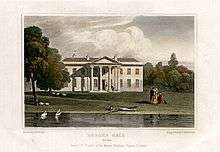Sir Francis Vincent, 10th Baronet
Sir Francis Vincent, 10th Baronet (3 March 1803 – 6 July 1880)[1] was an English Whig[2] politician.
Sir Francis Vincent, Bt | |
|---|---|
| Member of Parliament for St Albans | |
| In office 1831–1835 | |
| Preceded by | Viscount Grimston Charles Tennant |
| Succeeded by | Edward Grimston Henry George Ward |
| Personal details | |
| Born | 3 March 1803 |
| Died | 6 July 1880 (aged 77) |
| Political party | Whig |
| Spouse(s) | Augusta Elizabeth Chiswell
( m. 1824; |
| Relations | Edward Bouverie (grandfather) Edward Bouverie Jr. (uncle) Henry Bouverie (uncle) John Bouverie (uncle) |
| Children | Blanche Vincent |
| Parents | Sir Francis Vincent, 9th Baronet Jane Bouverie Vincent |
| Education | Eton College |
Early life
Vincent was born in Bloomsbury on 3 March 1803. He was a son of Sir Francis Vincent, 9th Baronet and Jane (née Bouverie) Vincent. He "belonged to a very old family, which had possessed land in Leicestershire in the early fourteenth century, migrated to Northamptonshire and settled in Surrey, where the estate of Stoke d’Abernon, near Leatherhead, came into their hands by marriage into the Lyfield family."[3]
His paternal grandparents were the former Mary Muilman-Trench Chiswell and Sir Francis Vincent, 8th Baronet, the British Ambassador to Venice in 1790 (and brother of Henry Dormer Vincent). His maternal grandparents were the Hon. Edward Bouverie, MP (son of Jacob Bouverie, 1st Viscount Folkestone) and the celebrated hostess Harriet Fawkener (daughter of Sir Everard Fawkener). Among his maternal family were uncles Edward Bouverie Jr. of Delapré Abbey, Lieut.-Gen. Sir Henry Frederick Bouverie, and John Bouverie, rector at Midhurst.
Vincent graduated from Eton College in 1817. After Eton, he had a "perfunctory career in the cavalry."[3]
Career

He was elected at the 1831 general election as one of the two Members of Parliament (MPs) for the borough of St Albans in Hertfordshire.[4] He was re-elected in 1832,[5] and held the seat until the 1835 general election,[6] when he did not stand again.[2][7]
Later life
After leaving the House of Commons, he became the author of "triple-decker, silver fork novels," producing Arundel, a Tale of the French Revolution in 1840, and four others between 1867 and 1872. Vincent traveled around the fashionable vacation spots of Europe, including Baden-Baden, where the opening scene of his last novel, The Fitful Fever of a Life, was set in a gambling hall. According to Captain Gronow, Vincent was a gambler who "contrived to get rid of his magnificent property and then disappeared from society".[3]
Personal life
On 10 May 1824, He married Augusta Elizabeth Chiswell (c. 1805–1876), the only child of Richard Muilman Trench Chiswell and Mary (née Jurin) (a daughter of Dr. James Jurin). His wife inherited Debden Hall in Uttlesford from her father. Together, they were the parents of one child:[3]
- Blanche Vincent (1829–1914), who married John Raymond Cely-Trevilian (1841–1884), son of Maj. Maurice Cely Trevilian.[3]
Vincent died intestate on 6 July 1880, Debden Hall passed to his daughter Blanche, who sold it to William Fuller-Maitland two years later.[8] As he died without male issue, the baronetcy was inherited by his grand-uncle Henry Dormer Vincent's son, the Rev. Frederick Vincent, himself father of the 12th, 15th and 16th (and last) Baronets (who was Edgar Vincent, 1st Viscount D'Abernon).[9]
References
- Leigh Rayment's list of baronets – Baronetcies beginning with "V"
- Stooks Smith, Henry. (1973) [1844–1850]. Craig, F. W. S. (ed.). The Parliaments of England (2nd ed.). Chichester: Parliamentary Research Services. pp. 148–149. ISBN 0-900178-13-2.
- "VINCENT, Sir Francis, 10th bt. (1803-1880), of Debden Hall, nr. Saffron Walden, Essex". www.historyofparliamentonline.org. History of Parliament Online. Retrieved 15 July 2020.
- "No. 18802". The London Gazette. 10 May 1831. p. 901.
- "No. 19009". The London Gazette. 1 January 1833. p. 2.
- Leigh Rayment's Historical List of MPs – Constituencies beginning with "S" (part 1)
- Craig, F. W. S. (1989) [1977]. British parliamentary election results 1832–1885 (2nd ed.). Chichester: Parliamentary Research Services. p. 261. ISBN 0-900178-26-4.
- Temma F. Berg (2006). The Lives and Letters of an Eighteenth-century Circle of Acquaintance. Ashgate Publishing, Ltd. p. 262. ISBN 978-0-7546-5599-2.
- Richard Davenport-Hines, 'Vincent, Edgar, Viscount D'Abernon (1857–1941)', Oxford Dictionary of National Biography, Oxford University Press, 2004; online edn, Jan 2008, accessed 10 July 2011.
External links
- Hansard 1803–2005: contributions in Parliament by Sir Francis Vincent
| Parliament of the United Kingdom | ||
|---|---|---|
| Preceded by Viscount Grimston Charles Tennant |
Member of Parliament for St Albans 1831 – 1835 With: Richard Godson 1831–1832 Henry George Ward 1832–1837 |
Succeeded by Edward Grimston Henry George Ward |
| Baronetage of England | ||
| Preceded by Francis Vincent |
Baronet (of Stoke d'Abernon, Surrey) 1809 – 1880 |
Succeeded by Frederick Vincent |